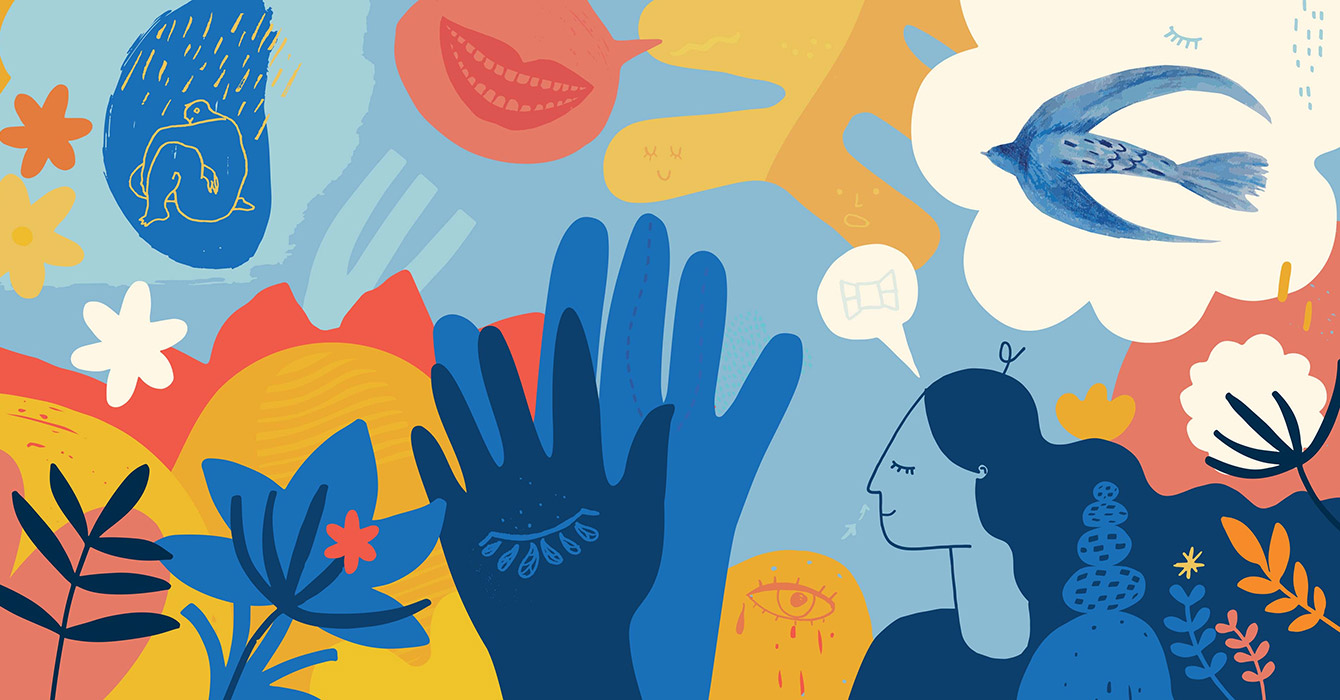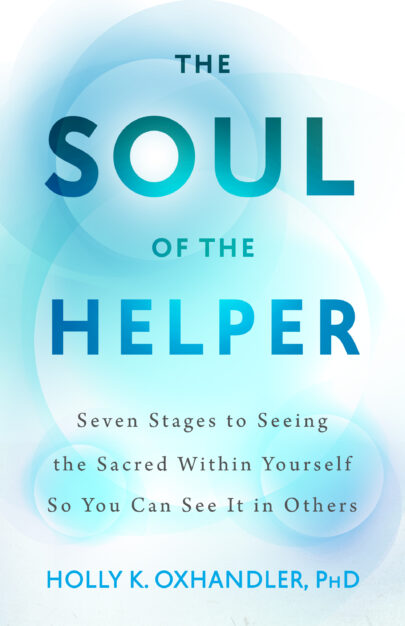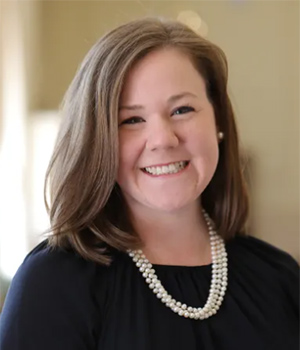Holly K. Oxhandler: Caring for others’ spirituality starts with cultivating your own

Caregivers must be able to recognize the image of God within themselves in order to care for it within others, says the author of a recent book.
When doing the research for her new book, “The Soul of the Helper,” Holly Oxhandler found that the lessons emerging from her study of mental health care providers would also apply to all caregivers, even those outside health care.
Looking at the degree to which mental health care providers were integrating their clients’ spirituality or religion into their mental health treatments, Oxhandler found a positive relationship with the quality of care — and a personal mission to help people acknowledge their own spirituality when caring for others.

“[Recognizing one’s own spirituality] is really applicable to everyday helpers, especially given the large percentage of folks who identify as being religious or religion being important in their lives,” Oxhandler said.
Across all sorts of care professions, having a healthy spiritual life oneself can correspond quite closely with being able to provide spiritual care to others, she argues in the book.
Oxhandler is an associate professor of social work at Baylor University and has a background in spiritually integrated mental health.
She spoke with Faith & Leadership’s Chris Karnadi about the book and the hope she has for caregivers to recognize and care for their own souls before caring for others. The following is an edited transcript.
Faith & Leadership: Who are the readers you wrote the book for, and what did you hope they would learn?

Holly Oxhandler: The ideal readers that I had in mind with this book are the everyday helpers for whom faith is important, and perhaps they are wrestling with mental health struggles or they love someone who is wrestling with mental health struggles or they are bumping up against those edges of burnout.
They continue to go and do and help and serve in whatever ways they are uniquely equipped to care for others, but they’re realizing that in their efforts to serve, they just get exhausted. They are realizing that they need to find new ways to refill their own wells as they go out and serve others.
Especially after these last couple of years, the book is for parents, teachers, faith leaders, mental health care providers and general health care providers, but also the everyday helpers like the baristas and our engineers and our community organizers who are still serving others in their own unique ways. It’s those informal caregivers especially I was thinking of when I wrote this book.
F&L: How would you go about convincing people who don’t think they are caregivers that they are providing care?
HO: First of all, I think that each of us has the capacity to be a caregiver or to be a fellow helper in one way, shape or form.
As we go about our days, we are tending to and supporting and helping and loving those around us in a number of different ways, whether that’s through our volunteer service or in connection with our friends or family members or the people that we interact with at work. On a daily basis, we’re engaging in some form of helping or serving or just connecting with those individuals.
I really would hope that those who are serving in these myriad ways recognize that the ways that they interact and support and serve and help and care for others are profound and have a big impact on the lives of those around them, whether that’s a close loved one or a complete stranger.
As someone who identifies as Christian, I think about the idea of loving my neighbor as myself. That really does have a strong emphasis on recognizing that I am serving others in some capacity, even just as someone who identifies as a Christian or who is trying to embody and live out a life that follows what Jesus taught me. I mean, I would really push and try to encourage folks to recognize that we all have the capacity to be a helper in one way, shape or form.
F&L: Why do you think considering one’s own spirituality is so important in offering care?
HO: The heartbeat of this book is recognition that caregivers and helpers have got to wake up to the sacred, to that divine spark, that image of God within themselves as they go out and serve others.
We need to wake up to the fact that we are worth caring for and tending to — the gift of our precious and sacred life. And that this life is not promised, and that it is a gift to get to steward it.
We have to wake up to it within ourselves so that we can care for ourselves well, especially so that as we go out and serve others, we’re better positioned to discern and best meet the needs around us and to recognize and tend to the sacred, the image of God, that divine spark within our neighbors as we go out and serve.
In part, my fear is that if helpers are not taking that time to tend to their own inner landscape and all of those layers within them that make up who they are, there is a risk of them imposing the pain, the difficulty that many of us experience through our lives on those around them as they’re trying to help.
Father Thomas Keating writes about “programs for happiness” — that many of us will go through our lives aware or unaware that we are seeking power, control or affection. And my fear is that helpers are not paying attention to the sense of their own belovedness, that they are worth that love and care, and they will unintentionally go out and seek those programs for happiness as they serve others and unintentionally cause harm in that process.
F&L: What kinds of beliefs and practices do you think lead to burnout for caregivers?
HO: I want to emphasize that the contribution to burnout comes from individual but also systemic sources. Individuals may be wanting to seek the affirmation, the accolade, just the addictive dopamine bump that they get when they’re giving and serving and helping others, but also they may have been surrounded by systems that communicate that their worth is dependent upon what they do. If their value is dependent on their productivity, or the way that they help and serve, they just go without even realizing the ways that it could potentially be hurting themselves and others.
Then the other piece, especially around those systemic issues, is when we have organizations and systems set in place that don’t allow the helpers to truly heal and rest and recover from the occupational hazards of the work that they do in serving others.
Without having systems in place to support them, burnout is inevitable in some ways, because of the ways that health care providers, faith leaders, other caregivers are exposed to secondary trauma, vicarious trauma, compassion fatigue and more. Without having systems in place to allow them to heal, I think, it just really increases their risk of burnout.
F&L: What are some things that need to be realigned to create more sustainable habits or more sustainable conditions for caregivers?
HO: What would be implemented would be unique based on the individual, the organization, the system, the region, the type of caregiving and things like that.
Some of the things that need to be put in place, though, are individuals starting to recognize their inherent worth and that they are worth a slower pace, and beginning to advocate for others to have access to this as well.
This is a big part of what social workers do, and I love that I get to be a social worker and the ways that we can advocate for more policies and systems to be in place for things like, for example, a paid maternity leave.
I do hope to see more helpers modeling the need to do this work — to slow down and to ask for help, to learn to ask for help with humility, and recognizing that the previous helpers were not able to do everything for everyone all of the time. So learning how to humbly ask for help and to receive — not just ask but receive — that help.
That’s not easy for helpers. I don’t think that’s easy for many of us, but when we have picked up that narrative that we are the helpers, we do all the service, it’s really hard to humbly allow others to care for and help us. So I think some of that modeling is important. And the advocacy piece, I think, is important.
Advocating for more mental health care would be something that I would just love to see more generally.
We know that about half of all lifetime cases of mental illness in the U.S. pop up by the time kids are 14, and about 75% by age 24. So we see this in younger individuals. And then again throughout life, over 80% of us meet criteria for a mental health struggle at some point.
Having space for mental health treatment to allow us to do some of this self-reflective work, I think, is really important too, alongside our spiritual practices and religious practices that help us connect to God, to whomever we believe in in terms of our higher power.
F&L: What is your Namaste Theory for helpers?
HO: I found that mental health care providers who were more deeply motivated to live out their belief (whatever it was that they believed in) and were more deeply connected with the divine within themselves tended to have more positive views and were more likely to actually integrate their clients’ religion or spirituality into treatment.
And it wasn’t just in my sample of social workers, psychologists, family therapists, counselors and nurses, but we saw this in other samples where the mental health care providers who had higher levels of religiosity — were more frequently engaged in their religious practices — tended to integrate the clients’ faith in more.
Namaste, which translates to mean “the sacred within me recognizes the sacred within you,” really brought order to what I was finding within my research.
As I talked with other helpers, it made sense to them too. When folks are more deeply grounded in what they believe in, they’re able to hold that space for those around them to explore and to ask questions and to wrestle with their faith in a nonjudgmental way.
Translating that to the everyday helper is really where the heartbeat within this book is. And recognizing that we as helpers — it’s really on us to pay attention to our inner landscape, including that divine spark, that image of God within ourselves, as we go out and serve others so that we can recognize it within others while recognizing that we are worth the love and care that we give to so many others.


Share